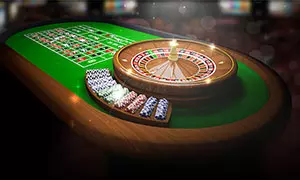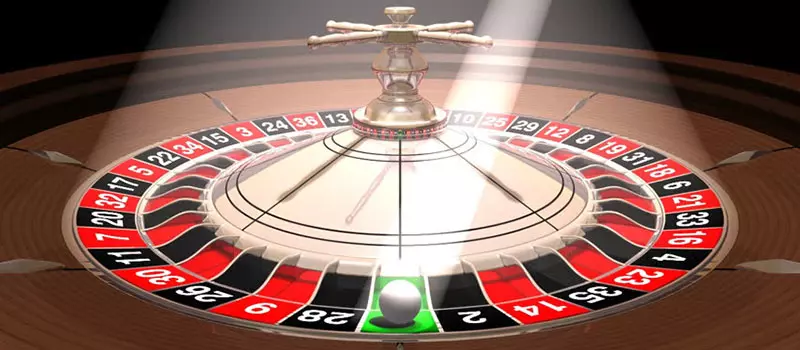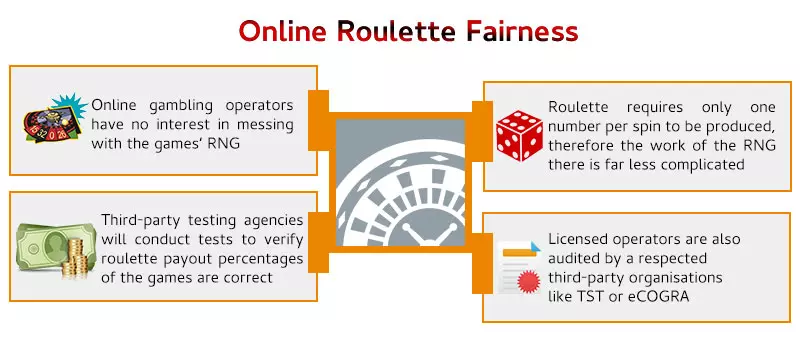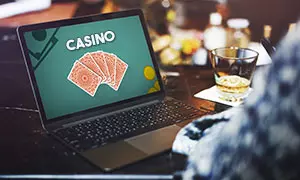 Ever since it was first introduced in 18th-century France, roulette has been an inseparable part of brick-and-mortar casinos and is the game that many people most readily associate with gambling. The game of roulette was allegedly invented by the French mathematician Blaise Pascal while he was attempting to create a perpetual motion machine in the 17th century. This was followed by the introduction of the game across Europe, and roulette quickly established itself as a favourite among the aristocracy on the Continent. The game then travelled across the ocean to the New World, where an important change was introduced to the wheel – the addition of the zero pocket, which nearly doubled its house edge.
Ever since it was first introduced in 18th-century France, roulette has been an inseparable part of brick-and-mortar casinos and is the game that many people most readily associate with gambling. The game of roulette was allegedly invented by the French mathematician Blaise Pascal while he was attempting to create a perpetual motion machine in the 17th century. This was followed by the introduction of the game across Europe, and roulette quickly established itself as a favourite among the aristocracy on the Continent. The game then travelled across the ocean to the New World, where an important change was introduced to the wheel – the addition of the zero pocket, which nearly doubled its house edge.
A couple of centuries later, roulette continues to enjoy the status of one of the most iconic casino games in the world and features in the catalogues of hundreds of online casinos. Online roulette variations are indeed impressive in terms of authenticity, but many players are put off by the fact that they cannot see a physical ball spinning across a physical wheel. This leads them to question the fairness of online roulette games. Many ask themselves the question, “Is online roulette rigged, or is it truly random, as it is supposed to be?” If you are one of these players, read on to find the answers to your questions and to understand how online roulette actually works.
The Randomness of Results in Roulette
One of the key traits of roulette is that it is subject to the so-called law of independent trials. This is not the case with other iconic casino games such as blackjack, where each hand you play (as well as your decisions about how to play it) affects the outcome of subsequent hands. For instance, imagine that you are dealt two aces in a single-deck game. The chances of receiving another ace if you hit are reduced simply because you are already holding two out of the four aces.
This, however, is not the case in roulette, where all outcomes are actually independent of one another. This means that each result is neither affected by previous results nor does it influence any that follow. In other words, there is no way for players to obtain any useful information from previous spins that would enable them to predict correctly the results of subsequent spins.
The randomness of outcomes in land-based roulette results from the random arrangement of the numbers on the wheel, which are not ordered sequentially; the same applies to online roulette. Consequently, each of the 37 numbers on a European roulette wheel has an equal chance of being spun. The odds of hitting any individual number are always 36 to 1, as there are 36 ways to lose the bet and only one number that guarantees a win. Similarly, if you have just won with Black, the probability of hitting Black again on the very next spin will remain exactly the same – 19 to 18.
Meanwhile, it is equally important for players to understand that the spins in roulette are statistically related to a certain extent. While it is not impossible for Black to hit a thousand times in a row, this is highly unlikely from a statistical point of view. It all comes down to how much you play and how many outcomes are factored in.
This is called the Law of Large Numbers (also known as the Law of Averages), and it dictates that the frequencies of events that have the same probability of occurring tend to even out, provided that enough trials are conducted. In the context of probability, “enough” often means millions of trials. Thus, if you play one million spins betting on Red/Black, roughly half of the time you will get Red, while during the other half you will hit Black. This will not necessarily be the case if you play only ten spins of roulette.
Some people mistakenly use an insignificant number of trials to illustrate the Law of Averages, a misconception known as the Gambler’s Fallacy. For instance, such a player might win with an Odd bet four times in a row, which would lead them to believe they should bet on Even next time because an even number is “due” to appear. They falsely assume that the frequencies of Odd and Even outcomes have already evened out. This is far from true because each spin of the ball is an independent event and, therefore, the actual probability of the Odd and Even outcomes will remain equal for the next spin and for the spins that follow.
However, if that person bets on Odd or Even enough times (say, one or two million), the Law of Averages will assert itself and the numbers of the two outcomes will become very close to equal – though not entirely, because of the additional zero pocket. Unfortunately, one would need quite a sizeable bankroll to undertake this experiment.

Biased Wheels
In land-based games of roulette, there are instances where players may encounter what are called “biased” or “crooked” wheels. Such wheels affect the randomness of the outcomes, meaning that certain numbers are more likely to be spun than others. In most cases, this bias results from a defect during the manufacturing process. On occasion, the wheel may become biased as it wears out through prolonged use.
It is possible to differentiate between two types of biased wheels. Some appear to favour specific individual numbers, while on others the ball “prefers” entire sectors covering larger clusters of pockets. Various factors might contribute to a wheel displaying bias over time. These include uneven deceleration and increased tilt, damaged balls, dissimilarities in pocket size, damaged or unusually high pocket frets, and even minute scratches on the pockets’ surface.
After several days of play on one such wheel, it is possible for players to detect the bias and attempt to use it to their advantage. That being said, it is worth mentioning that casino personnel also observe these tendencies closely, and such wheels are usually replaced immediately after a defect is noticed.
Some players even go so far as to accuse the house of cheating on purpose with biased wheels, or of using hidden magnets to determine where the ball lands. Both notions are nonsensical for a number of reasons, the first being that such defects are actually beneficial to players – the house is quick to get rid of these wheels as soon as their bias becomes apparent.
Secondly, if you happen to lose money at a rapid pace, you are most likely not being cheated by the casino but simply lack a proper understanding of the bet types in the game and of adequate bankroll management. Finally, the notion of casinos using magnets to influence the course of the ball is indeed ludicrous for the simple reason that the balls used in the game are actually plastic.

House Edge in the Game of Roulette
The house edge in online roulette coincides with that of the games played in brick-and-mortar gambling venues. Understanding the house edge is essential for any successful roulette player, regardless of whether they are betting online or offline. In simpler terms, the house edge is the advantage that the house or the casino holds over players. This advantage is built into the payout percentages and, in roulette, it is impossible to avoid or reduce chiefly because this is a game of independent trials and players cannot predict the outcomes of the spins on the basis of previous results.
If you inspect the different types of bets in roulette and how much they return, you will notice there is a discrepancy between the payouts and the actual probability of winning with each bet type. For instance, the true odds of hitting any individual number amount to 36 to 1 in European roulette, where there are 37 pockets and only one zero. The casino odds, however, are smaller, as Straight bets pay out at a rate of 35 to 1.
The same applies to all other bets and their payouts. With outside bets such as Red or Black, there are 18 ways to win out of 37, which corresponds to a probability of 48.65% due to the additional zero pocket that causes such wagers to lose. Despite this, players receive an even-money payout, as if the chances of winning and losing with such bets were equal, while in fact the probability of losing exceeds that of succeeding and stands at 51.35%.
It becomes apparent that the addition of the zero pocket on the roulette wheel is anything but a coincidence. On European, single-zero roulette wheels, this tiny green pocket accounts for a house edge of 2.70%, which is to say that, on average, you will lose £2.70 for every £100 wagered. Meanwhile, the wheels in American roulette have an additional double-zero and 38 pockets overall. This almost doubles the house edge in this variant to 5.26%, and players are generally advised to avoid such games.
The house edge of all roulette bets is the same; the only exception is the Five Number bet, which is typical of the American variant and covers numbers 1, 2, 3, 0 and 00. This is among the absolute worst wagers one can make in a casino, save for certain bets in the game of craps that come with an even higher house edge. There are only five ways to win with this roulette bet, as opposed to 32 ways to lose. Yet, if you do happen to win, you will be paid out at casino odds of 6 to 1, which is ludicrous, to say the least. This corresponds to a house edge of 7.89% and explains why roulette experts consider placing the Five Number bet masochistic and a total waste of money.
| Roulette House Edge | |
|---|---|
| Roulette Type | House Edge (%) |
| French Roulette | 1.35 / 2.70 |
| European Roulette | 2.70 |
| American Roulette | 5.26 / 7.89 |
What Are RNGs and How Do They Work?
The outcome of the spins in land-based roulette is sometimes influenced by physical factors such as the amount of force the dealer applies when tossing the ball, friction, and air resistance. In online roulette games, randomness, and therefore fairness, is ensured through the use of bespoke pieces of software called Random Number Generators (RNGs).
It is important to mention that these programmes are used to create what is known as “pseudo” randomness because there is no need for external input for them to generate any output. Output in this context is synonymous with “outcome” or “result”. The software starts with an initial seed value as a reference point and then uses it to produce exceptionally long sequences of random numbers, based on a series of complex mathematical calculations or algorithms. Each long sequence of numbers itself becomes a seed and generates yet another sequence using the same algorithm as the first.
The interesting thing is that this elaborate piece of software never ceases to produce number sequences, even when no one is playing the game. Once a player loads an online roulette game, the outcome is determined at the very instant they hit the spin button. It depends on the number that is generated at the precise moment the button is clicked. However, because this action also sends the ball rotating around the virtual wheel, players are left with the deceptive impression that the result is yet to be decided.
Random Number Generators cannot ensure absolute randomness, but they create this impression because the algorithms they use to generate results are extremely complex and impossible for laypeople to understand. However, if someone were to obtain a powerful enough computer and the necessary software, they might be able to compute the sequence of numbers accurately, provided they knew the algorithm used and the initial seed number – the one from which it all started. The downside is that such information is kept top secret by casinos to prevent people from exploiting the games as well as to ensure all players have equal chances of winning.

The RNG in Online Casino Roulette
Random Number Generators determine the outcomes of every single virtual casino game, and roulette is hardly an exception to this rule. Unlike other casino games, roulette requires only one number per spin to be produced; therefore, the work of the RNG here is far less complicated. The specifics of this game of chance require simplified output in order for the outcomes of the spins to be generated. Let us use the game of European roulette as an example, where the pockets on the wheel contain numbers 0 through 36.
To determine the random result, the piece of software must generate an integer between 0 and 36. This integer is based on an input that could range from zero to a billion. For example, this might be a 32-bit number such as 2,356,548,475. This then has to be reduced to a simplified value corresponding to one of the pockets on the virtual wheel. The software reduces the long number to a shorter one using its complex algorithms.
Can Online Roulette Games be Rigged?
Since the RNG utilises formulae to generate outcomes, the question arises whether it is possible for casinos to rig the available games, roulette included, by tampering with the algorithms. To be frank, anyone could do so as long as they had accurate information about the algorithm and the initial seed – the one that was used to generate the very first long sequence of numbers. Without this information, it would not be possible to rig the games. More often than not, the software developers who created the virtual roulette games are among the few privileged individuals who know what the seed number is.
In addition, tampering with the games’ RNG is not in the interests of online gambling operators. If they are caught – and they most certainly will be, because the games are audited for fairness regularly – they risk having their licences revoked, not to mention that their reputation among players would be permanently damaged; and once that happens, there is no going back.

Fairness of Online Roulette RNGs
Major software developers such as Playtech and Microgaming have created bespoke variants of online roulette and, while these companies bear a certain degree of responsibility for testing their games, the auditing and verification of the Random Number Generators and the average player-return percentages are performed by impartial testing agencies such as eCOGRA and Technical Systems Testing (TST).
The task of these external companies is to check whether the RNGs are rigged to favour certain cards, roulette numbers, or symbols on the slots’ reels. If the auditors establish that no such bias exists, they will provide the online casino with a certificate to post on its website so that all players know the games on offer are fair and that the outcomes are determined randomly. That is to say, all players who bet on a given roulette variant or video slot will have equal chances of winning.
The third-party testing agencies will also conduct tests to verify whether the payout percentages of the games are correct. From a player’s perspective, this is the most important statistic because it indicates how much money one can potentially collect over time for every 100 units wagered on a given game. In order to verify a game’s theoretical return, the agency needs its full set of rules, whereupon a team of professional mathematicians performs various evaluations to obtain accurate results. Renowned casino operators update the payout percentages of their games on a monthly basis so that both new and existing players can see what return they can expect from any given title in the gaming collection.
When searching for an online casino at which to play roulette, players should first ensure they are registering with a licensed operator that is audited by a respected third-party organisation such as TST or eCOGRA. This will enable them to enjoy their online roulette experience to the fullest and will give them the confidence that they have just as much chance of hitting their lucky number as anyone else.






